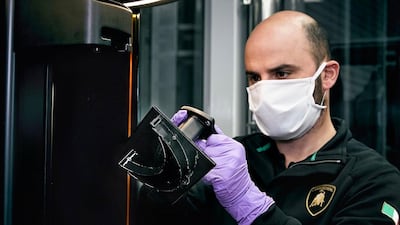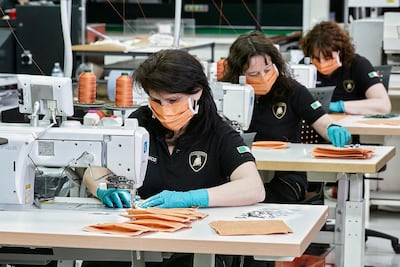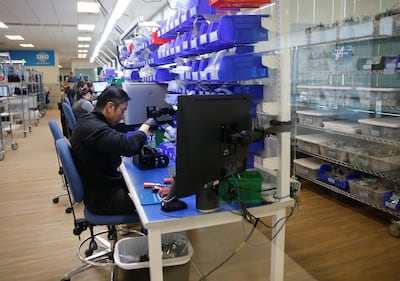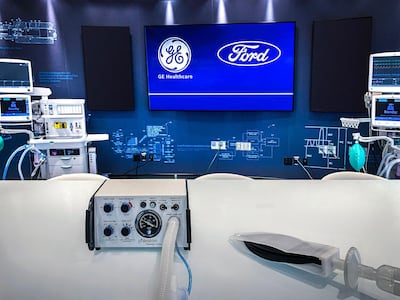Necessity breeds ingenuity and, in these trying times, the automotive industry, which is currently facing its toughest period in more than half a century, has answered the call by reinventing itself as a medical-equipment manufacturer. General Motors, Ford, Lamborghini, India’s Maruti Suzuki and Mahindra Group, and even the Formula One community are all working on medical solutions to help stop the spread of Covid-19.
Project Pitlane by F1
With no motor racing for at least three months, F1 teams - including Mercedes-AMG Petronas, Red Bull, McLaren, Renault, Racing Point, Haas and Williams - have placed rivalries on hold and are using their skills as a prototype industry to form a collective known as Project Pitlane.
With engineers working across the board and even relocating to different teams, depending on their skills with precision machines and 3D prototyping, F1 has developed a breathing aid to keep patients out of intensive care.
“If you have a problem in a race on Sunday, you need a solution by lunchtime Monday, so there’s time to convene a meeting later in the week as they need it in production by Wednesday,” former F1 driver and now TV commentator Martin Brundle says. “F1 has an absolute deadline of every second Sunday when the next race starts, so it has this can-do, must-do, will-do attitude to get things done quickly.”
While its star drivers Lewis Hamilton and Valtteri Bottas stay at home, the Mercedes-AMG team have been working with University College London to develop a breathing aid that doesn’t need a ventilator. Its Continuous Positive Airway Pressure device (CPAP) has already been approved by the NHS and the hope is to make 1,000 units a day.
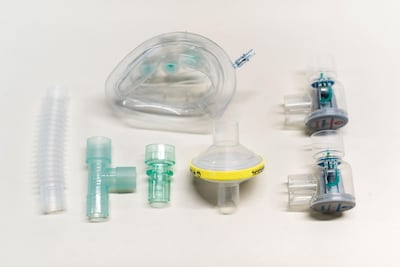
Despite only starting on March 18, the CPAP is being used in the two epicentres of China and Italy, and works by pushing a steady flow of oxygen-rich air into the patient at pressure so the lungs remain open, allowing for more oxygen supply.
Shields and masks by Lamborghini
Supercar manufacturer Lamborghini, meanwhile, has turned to making surgical masks and protective Plexiglas shields, using personnel from the saddlery that normally hand-stitches leather interiors, to produce 1,000 masks a day for the Sant’Orsola-Malpighi Hospital in Bologna. Located in the heart of the pandemic in northern Italy, Lamborghini is also using its 3D printers, which stamp out the carbon-fibre body panels of its cars, to make 200 protective medical shields a day. “We feel the need to make a concrete contribution,” Lamborghini chairman Stefano Domenicali said. "The S Orsola-Malpighi Hospital is an institution we have worked with for years and we will win this battle together.”
Ventilators by Mahindra and Maruti
Closer to home, the Mahindra Group is making cost-effective prototypes of ventilators, as India imports 85 per cent of its medical devices for intensive care. “We are proud of our team who confined themselves to the factories and without sleep to produce these in 48 hours.” chairman Anand Mahindra tweeted this week.
Neighbouring Maruti Suzuki chairman RC Bhargava met with the Indian government last week and agreed to work with ventilator manufacturer AgVa Healthcare to ramp up its target from a few hundred units to 10,000 per month.
Ventilators by GM and Ford
In the United States, Ford and General Motors are both working around the clock to find solutions for mass production, as that country takes the unenviable position of most cases of Covid-19. GM joined with Ventec Life Systems to convert its 24 million-square-metre electronics facility in Indiana to produce ventilators with the help of 1,000 volunteers from the United Auto Workers Union.
The company aims to deliver up to 10,000 critical care ventilators a month with the ability to scale up further, and also helped Ventec clear a 20,000-unit back-order at cost while producing a decade’s worth of ventilators in seven weeks.
The employee-led initiative was created, planned and approved in 48 hours, and includes converting its Warren, Michigan, plant to produce 50,000 surgical masks per day within two weeks and eventually 100,000 per day.
GM’s long-time rival, Ford announced a collaboration with GE Healthcare to produce up to 50,000 ventilators in Michigan within 100 days and up to 30,000 units a month thereafter. Ford says its ventilators differ by working on air pressure without the need for electricity, which could be vital for makeshift hospitals and remote areas.
The company will convert its Rawsonville Plant using 500 volunteers to produce 1,500 units by May, 12,000 by June and 50,000 by July 4.
